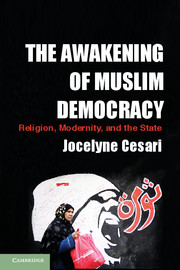Book contents
- Frontmatter
- Contents
- Acknowledgments
- Preface
- Part I THE MAKING OF ISLAM AS A MODERN RELIGION
- 1 Modernization and Politicization of Religion
- 2 Nation-State Building and the Inclusion of Muslim Polities within the Westphalian Order
- 3 Islam in the Constitution
- 4 Nationalization of Islamic Institutions and Clerics
- 5 Islam in the Legal System
- 6 Teaching Islam in Public Schools
- Part II ISLAMISM AS THE PREEMINENT POLITICAL FORCE PRE– AND POST–ARAB SPRING
- Part III THE DISJUNCTION OF DEMOCRACY AND SECULARISM – LESSONS LEARNED FROM THE ARAB SPRING
- Appendix I Religious Violence Index
- Appendix II Egyptian Constitution, Ratified on December 26, 2012. Suspended on July 3, 2013
- Bibliography
- Index
- References
2 - Nation-State Building and the Inclusion of Muslim Polities within the Westphalian Order
Published online by Cambridge University Press: 05 July 2014
- Frontmatter
- Contents
- Acknowledgments
- Preface
- Part I THE MAKING OF ISLAM AS A MODERN RELIGION
- 1 Modernization and Politicization of Religion
- 2 Nation-State Building and the Inclusion of Muslim Polities within the Westphalian Order
- 3 Islam in the Constitution
- 4 Nationalization of Islamic Institutions and Clerics
- 5 Islam in the Legal System
- 6 Teaching Islam in Public Schools
- Part II ISLAMISM AS THE PREEMINENT POLITICAL FORCE PRE– AND POST–ARAB SPRING
- Part III THE DISJUNCTION OF DEMOCRACY AND SECULARISM – LESSONS LEARNED FROM THE ARAB SPRING
- Appendix I Religious Violence Index
- Appendix II Egyptian Constitution, Ratified on December 26, 2012. Suspended on July 3, 2013
- Bibliography
- Index
- References
Summary
This book combines institutional and norm diffusion approaches to analyze the political modernization that occurred after the collapse of the Ottoman Empire, during the colonial period, and in the nation-building phase. The institutional approach focuses on the gradual social and cultural changes that can either generate novel institutions over long periods of time or produce unexpected breakdowns in existing institutions at critical thresholds. The norm diffusion perspective sheds light on the influence of international factors in the shaping of institutions.
In ways similar to constructivist analysis, our inquiry questions the premise of anarchy and equality of state actors as the given in international relations. In this vein, several studies have shown that far from being anarchic, international politics is continuously redefined by relations of power that shape institutions and rules. For example, Shmuel Eisenstadt, as well as Dominic Sachsenmaier, Jens Riedel, Nissim Otmazgin, and Eyal Ben-Ari, have demonstrated how the European society of states provided the standard for international politics and measures of civilization. Additionally, Vali Nasr and Bobby Said have shown that the adoption of the nation-state concept in Muslim-majority countries was the consequence not only of war or colonial power but also of the inclusion of Muslim polities in the international system. The major thesis of this book is that politicization of Islam has been a major outcome of this inclusion, an idea that has not yet been fully explored.
- Type
- Chapter
- Information
- The Awakening of Muslim DemocracyReligion, Modernity, and the State, pp. 19 - 30Publisher: Cambridge University PressPrint publication year: 2014



